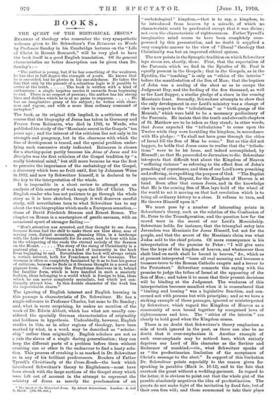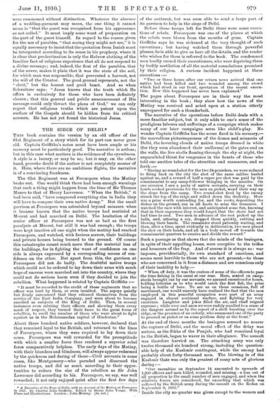BO OKS .
• The Quest of the Historical Jesus. By Albert Schweitzer. London : A. and C. Mick. [10e. &L not.] THE QUEST OF THE HISTORICAL JESUS.* READERS of theology who remember the very sympathetic welcome given to Dr. Schweitzer's Von Reimarus zu Wrede by Professor Sanday in his Cambridge lectures on the "Life
of Christ in Recent Research," will be very glad to have the book itself in a good English translation. Of its general characteristics no better description can be given than Dr. Sanday's
"The author is young, but if he has something of the weakness, he has also in full degree the strength of youth. He knows that he is one-sided, but he glories in hie one-sidedness. He takes the line that only by the pursuit of a relentless logic is it possible to arrive at the truth The book is written with a kind of enthusiasm : a single impetus carries it onwards from beginning to end. There is no respect of persons ; the author has his strong
likes and dislikes which he is at no pains to suppress He has an imaginative grasp of his subject ; he writes with clear- ness and vigour, and with a more than ordinary command of metaphor."
The book, as its original title implied, is a criticism of the course that the biography of Jesus has taken in Germany and France from Reimarus, who died in 1768, to Wrede, who published his study of the "Messianic secret in the Gospels" ten years ago ; and the interest of the criticism lies not only in its strength and pungency, but in the clearness with which the
line of development is traced, and the special problem under- lying each successive study indicated. Reimarus is chosen for a starting-point partly because his Aims of Jesus and his _Disciples was the first criticism of the Gospel tradition by " a
really historical mind," but still more because he was the first • to perceive the importance of the eschatology of the Gospel, - a discovery which bore no fruit until, first by Johannes Weiss in 1892, and now by Schweitzer himself, it is declared to be the key to the interpretation of the whole.
It is impossible in a abort review to attempt even an analysis of this century of work upon the life of Christ. The English reader who has not patience to go through the whole story as it is here sketched, though it well deserves careful study, will nevertheless turn to what Schweitzer has to say about the two biographies which made a European sensation,— those of David Friedrich Strauss and Ernest Renan. The chapter on Renan is a masterpiece of gentle sarcasm, with an occasional spurt of stronger feeling :—
" Men's attention was arrested, and they thought to see Jesus, because lienan had the skill to make them see blue skies, seas of waving corn, distant mountains, gleaming lilies, in a landscape with the Lake of Gennesareth for its centre, and to hear with him in the whispering of the reeds the eternal melody of the Sermon
on the Mount The story of the rising of Christianity is a pastoral play There is a kind of insincerity in the book
from beginning to end. Nevertheless the book will always retain a certain interest, both for Frelichmen and for Germans. The German is often so completely fascinated by it as to lose his power of criticism, because he finds-in it German thought in a novel and piquant form. Conversely the Frenchman discovers in it, behind the familiar form, -which is here handled in such a masterly fashion, ideas belonging to a world which is foreign to him, ideas which he can never completely assimilate, but which yetcon- tinually attract him. In this double character of the work lies its imperishable charm."
The ignoring of English interest and English learning in this passage is characteristic of Dr. Schweitzer. He has a single reference to Professor Charles, but none to Dr. Sunday; and, what is more surprising, he makes no mention of the work of Dr. Edwin Abbott, which has what are usually con- sidered the specially German characteristics of originality and boldness in hypothesis. Undoubtedly, however, English studies in this, as in other regions of theology, have been marked by what, in a word, may be described as " scholar- ship " rather than originality. English scholars are not as a rule the slaves of a single daring generalisation ; they can keep the different parts of a problem before them without crushing one or other in the endeavour to find a hasty solu- tion. This process of crushing is as marked in Dr. Schweitzer
as in any of his brilliant predecessors. Readers of Father Tyrrell's Christianity at the Cross-Roads—the book which introduced Schweitzer's theory to Englishmen—must have been struck with the large sections of the Gospel story which
were left out of account in the attempt to represent the ministry of Jesus as merely the proclamation of an
" eschatological " kingdom,—that is to say, a kingdom, to be introduced from heaven by a miracle, of which no characteristic could be predicated except that it was divine ; not even the characteristic of righteousness. Father Tyrrell's imaginative mind seems to have been completely over- powered by this presentation, and no doubt it supplied a very complete answer to the view of "liberal" theology that Christianity was but an improved ethical system.
The new points in the Synoptic tradition on which Schweitzer lays stress are, shortly, these. First, that the expectation of the Parousia which we find in the Epistles of St. Paul is equally present in the Gospels ; that in the Gospels, as in the Epistles, the " teaching " is only an " ethics of the interim " before the manifestation of the Son of Man ; that the baptism of John was a sealing of the elect so as to escape the Judgment Day, and the feeding of the five thousand, as well as the Last Supper, a similar pledge of a share in the coming Messianic feast. Secondly, Schweitzer attempts to show that the only development in our Lord's ministry was a change of view in respect to the " tribulations " or " birth-pangs of the Messiah," which were held to be a necessary preliminary of the Parousia. He insists that the tenth and eleventh chapters of St. Matthew are to be taken as they stand; in other words, that Jesus expected the " tribulations " to come upon the Twelve while they were heralding the kingdom, in accordance with His pledge : " Ye shall not have gone through the cities of Israel till the Son of Man be come." But as this did not happen, he holds that Jesus came to realise that the "tribula- tions " were to be let loose, and indeed accomplished, by Himself ; so that He proceeded to Jerusalem to die. Schweitzer interprets that difficult text about the Kingdom of Heaven "suffering violence " as referring to the effect first of John's preaching of repentance, and then of our Lord's own preaching an &suffering, in expediting the purpose of God. " The Baptist appears, and cries, Repent, for the Kingdom of Heaven is at hand. Soon after that comes Jesus, and in the knowledge that He is the coming Son of Man lays hold of the wheel of the world to set it moving on that last revolution which is to bring all ordinary history to a close. It refuses to turn, and He throws Himself upon it."
We must pass by a number of interesting points in Schweitzer's theory, such as the relation of the Confession of St. Peter to the Transfiguration, and the question how far the crowd were in the secret of our Lord's Messiahship. Schweitzer holds, for instance, that the triumphal entry into Jerusalem was Messianic for Jesus Himself, but not for the people, and that the secret of the Messianic claim was what Judas sold to the chief priests. Of more consequence is his interpretation of the promise to Peter : "I will give unto thee the keys of the kingdom of heaven, and whatsoever thou shalt bind on earth shall be bound in heaven," &c., which as at present interpreted -" loses all real meaning and becomes a treasure-trove to the Roman Catholic exegete and a terror to the Protestant." Schweitzer connects this saying with the promise to judge the tribes of Israel at the appearing of the Son of Man ; and takes it to mean that their present decisions will be binding at the Judgment. The weakness of this interpretation becomes manifest when it is remembered that " binding and loosing " was a legislative function, and con- cerned not with persons but with principles ; and so we have a striking example of those passages, ignored or misinterpreted by Schweitzer, which regard the Kingdom of Heaven as a community of men bound together by recognised laws of righteousness and love. The " ethics of the interim " are clearly to hold good when the Kingdom comes.
There is no doubt that Schweitzer's theory emphasises a side of truth ignored in the past, as there can also be no doubt that it over-emphasises it. Another example of such ever-emphasis may be noticed here, which entirely deprives our Lord of His character as the Savibur and Redeemer of mankind,—viz., what Schweitzer spealts of as " the predestinarian limitation of the acceptance of Christ's message to the elect." In support of this limitation Dr. Schweitzer points especially to the reason given for speaking in parables (Mark iv. 10-12), and to the 'fate that overtook the guest without a wedding-garment. In regard to the latter, it is obvious to point out that the whole gist of the parable absolutely negatives the idea of predestination. The guests do not make light of the invitation by fixed fate, but of their own free will; and those summoned to take their place
were summoned without distinction. Whatever the absence of a wedding-garment may mean, the one thing it cannot mean is "that the guest was recognised from his appearance as not called." It must imply some want of preparation on the part of the guest himself. In regard to the reason given for the use of parables, " that seeing they might not see," it is equally necessary to insist that the quotation from Isaiah must be interpreted according to its sense in his prophecy, where it is clear that predestination is only the Hebrew clothing of the familiar fact of religious experience that all do not respond to a divine message; and, indeed, the first of the parables, that of the sower, makes it plain that it was the state of the soil, for which man was responsible, that prevented a harvest, not the will of the Creator. The good ground represents, not the " elect," but the honest and good heart. And so when Schweitzer says " Jesus knows that the truth which He offers is exclusively for those who have been definitely chosen ; that this general and public announcement of His message could only thwart the plans of God," we can only regret that religious truths which are patent upon the surface of the Gospels should be hidden from his critical acumen. He has not yet found the historical Jesus.















































 Previous page
Previous page